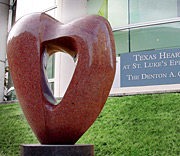Texas Heart Institute Recruiting Patients for Clinical Trial
to Address a Common Genetic Heart Disease
Incurable Hypertrophic Cardiomyopathy
a Leading Cause of Sudden Death in Young
Houston, Texas (October 8, 2013) – Doctors and researchers at the Texas
Heart Institute (THI) are
recruiting patients to participate in a clinical trial they hope will lead
to a way to prevent and
reverse hypertrophic cardiomyopathy (HCM), the most
common genetic
heart
disease, and a common cause of sudden
cardiac
death
(SCD) in young people,
especially young
athletes.
HCM, which is genetically transmitted, causes a thickening
of the heart muscle and causes the heart muscle
to function abnormally.
It can affect people of any age. Often, there are no
symptoms in young people and
the first sign of
the undiagnosed disease
can be sudden cardiac
death (SCD). It can
also
cause disabling cardiac symptoms such as shortness of
breath, chest pains, palpitations,
and fainting. It is also an
important cause of cardiac
complications in
the elderly.
Current medicines
used
to treat patients
with HCM treat symptoms and
reduce risk of SCD, but none
reverse the disease.
THI researchers, in a small randomized
group of 75
patients over 12 months, will study
use of the drug, N-Acetylcysteine (NAC), commonly used as an anti-oxidant and to treat
cystic fibrosis patients because
of its ability to break down
mucus
in the body.
Previous animal models showed NAC helped reduce thickening of the heart muscle
and
fibrosis in heart muscle tissue, features of HCM, and improve
cardiac dysfunction
(diastolic dysfunction) which
causes shortness of breath and exercise
intolerance.
"We believe this
drug offers promise because it addresses
at the molecular
level certain changes in the cardiac proteins that
are the consequences of the causal mutations present in patients
with HCM," said the trial's principal
investigator, Dr.
A. J. Marian, a THI researcher and professor at The University of Texas Health
Science Center in
Houston.
"It's a
safe drug and
we also hope
to prove that
it is also effective as a potential
therapy. Given that
there
is no effective pharmacological
therapy for HCM, we are
excited and
hope that our colleagues will share our
enthusiasm in testing the
beneficial effects of
this safe medication
in
patients with HCM."
For
more
information
about the trial, see
http://www.stlukeshouston.com/OurServices/Research/StudyDetail.cfm?PNO=HSC-MS-10-0533.
For media inquiries please contact:
Director of Public Affairs
Texas Heart Institute
Frank Michel ♦ 832-355-9510 ♦ fmichel@texasheart.org
For THI media profile, see Public Affairs.



